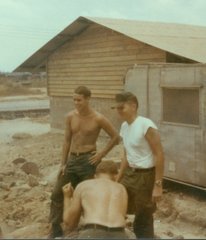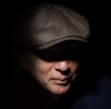Don't wait for a hero....

This is me (shirt), Howard Dirler (no shirt grinning), and
Robert Wilburn (no shirt, no grin, filling sandbags). The photo was taken in Vietnam in 1967,
probably in March because Dirler and Wilburn rotated out in April. Note that Howard and I are not working. We were sergeants supervising the never
ending sand-bag-filling detail. Wilburn,
a Specialist 5, should have been exempted from the sand bag detail, by rank, so
I suspect he had committed some minor rule infraction, like missing morning
formation, which he was often guilty of.
This story isn’t about Dirler or Wilburn; it’s about me and
Specialist 4 Castellanos and to be perfectly honest, I play a minor role in the
story. From here on, it’s Castellanos;
one of the most memorable men I’ve ever known.
Dirler and I were promoted from E-5 to E-6 early in
1968. With the extra pay came new
responsibilities, primary among them, we became the Platoon Sergeants of the
two platoons that included all the enlisted men in Headquarters &
Headquarters Company 214th Combat Aviation Battalion. Our units flew support primarily for 9th
Infantry Division, and on occasion Special Forces and units of the Royal Tai
Army. We were based at Camp Bearcat, geographically
30 kilometers from Saigon via helicopter, another 7 kilometers via road.
Camp Bearcat was centrally located for operations in the III
Corp Area. Unfortunately, it was near a
major Viet Cong supply trail. There’s a
verse in Billy Joel’s song, Goodnight Saigon, that sums up life
that close to a VC supply trail –
We held the day in the palm of our hands
They ruled the nights, and the nights
Seemed to last as long as six weeks...
Our unit operated 24/7.
In my platoon, I had clerks, chaplain’s assistants, radiomen, cooks,
supply technicians, truck drivers, linemen, and transit enlisted
personnel. Those who weren’t working
were required to stand morning formation.
Other than making sure they did that and insuring the barracks were
squared away, I had only one other supervisory responsibility. When we were hit, which because of our
proximity to the supply trail, happened more and more often as the war
progressed, it was my job to make sure everyone was out of the barracks. That wasn’t always an easy task since some of
the guys could sleep through anything.
When a new man arrived, I gave each a tour of the company
area and assigned him a bunk. In early
May, our Company Clerk, Specialist Fleury, sent a runner to my room with the
message that I had a new man waiting in the orderly room. A few minutes later, I walked into the
orderly room, took one look at the new man, and thought, this is it; the war is over, there’s no one left to send.
He was short, maybe 5’7” or 5’8”, skinny as a rail, and
white. I don’t mean white in a racial
sense. He was white like someone who has
never been outside in daylight. He had thin,
stringy, blond hair, glasses so thick I wondered how he could see through them,
and a thriving crop of pimples.
Fleury said, “Sarge, this is Castellanos. He just arrived, and I’ve assigned him to
your platoon.”
He shifted his gaze to Castellanos, “Sergeant Carson is your
platoon sergeant. He’ll show you around.”
I showed Castellanos the major attractions of the company
area; the mess hall, supply, dispensary, showers, latrine and the bunker. I told him when we were hit, no matter where
he was or what he was doing, he was to go straight to the bunker. As we finished the tour I said, “Castellanos,
you look pretty young. How old are you?”
In a voice so soft I could barely hear his words he said, “I
turned 18 on Guam yesterday, Sarge. I
was there a week waiting for my birthday before I could come to Vietnam.”
I stopped walking and so did Castellanos. When he looked up at me I said, “You
volunteered for Vietnam, didn’t you?”
His lower lip trembled, and I knew he was working hard to
hold my gaze, “Yes, Sergeant. In fact, I’m
regular army. I enlisted the day I
graduated from high school. Vietnam was
the reason.”
Later, when I thought about our conversation, I realized
that he expected me to give him a hard time for volunteering. Instead I grinned and said, “Me too,
Castellanos. I volunteered to find out
what this was all about and because I figured someday I’d have kids and
grandkids, and I didn’t want to tell them I spent my time at Fort Sam Houston,
Texas.”
We continued our tour and as we walked I said, “Why did you
volunteer?”
“I had to, Sarge. My
grandfather was in the army during the First World War, my father was in the
army during World War Two and my uncle was in Korea.”
“Sounds like you Castellanos guys didn’t miss a single
conflict.”
In an even softer tone he said, “I was afraid I’d miss this
one.”
I laughed, “Wait until it gets dark. You’ll know you didn’t miss this one.”
Just before lights out, I was upstairs in my “private room,”
a corner partitioned away from the open bay with 4X8 sheets of plywood. I was trying to beat my record for
disassembling and reassembling my .45 when there was a timid knock on my
door.
I called out, “Come in,” in my best platoon sergeant voice. The door slowly opened and Castellanos, his
eyes fixed on the floor, cap in hand, slid into the room. I could sense something was seriously wrong. I swung my legs off the bunk and stood in
front of him. In my real person voice I
asked, “What’s up, Castellanos?”
It took some time, but finally he lifted his gaze from the
floor, looked in my eyes, and blurted out, “Sarge, I’m scared.”
“Castellanos, we’re all scared. There are a lot of people out there who want
to kill, us and they’re not very far away.”
He tried to grin but couldn’t quite pull it off. Then he said, “I don’t mean that kind of
scared, Sarge. In fact, that doesn’t
scare me at all.”
“Well, what are you scared of then, Castellanos?”
I wasn’t ready for his answer. “I’m scared that I’m a coward. You see my grandfather was a hero and so were
my father and my uncle. I’m afraid that
I’ll turn out to be a coward.”
That wasn’t covered in my NCO training. I’m sure I stumbled and stuttered before I
said anything but finally I managed to say, “Look at me Castellanos. You’re going to be OK. When the time comes, you’ll know what to do,
and you’ll do it. Trust me.”
He looked at me and burst into tears. I thought I’d totally failed in my feeble attempt
to reassure him until he managed to say, “Are you sure, Sarge? Are you absolutely sure?”
I looked directly into his eyes and said, “I’m absolutely
sure, Castellanos. You’re going to be
just fine. Trust me.”
A few minutes later he left my cubicle. I heard him shuffle down the hall, open the
door, and start down the outside stairs.
Seconds later, Fleury turned off the lights. I pulled my flashlight from under my pillow
and by its light finished reassembling my .45.
Done, I slammed in a clip and jacked a round into the chamber, lowered
the hammer and put the weapon under my pillow.
At two AM a rocket exploded on the 9th Division helipad a
hundred yards away. Seconds later
another hit in the same place.
Before the third one went off, I was out of my bunk, .45 in
my shoulder holster, and flashlight in hand.
The third hit was a mortar, and it was much closer than the first
two. Judging from the sounds I’d heard
between explosions, I was pretty sure everyone was out of the second floor bay,
but not checking wasn’t an option for me.
I began making my way down the east side row of bunks, checking each
one. At the end of the row I moved over
to the west side and started back toward the door.
I could hear choppers, ours and 9th Division’s, cranking
up. Incoming rounds were getting closer,
the explosions lighting up the barracks like lightning flashes. I was halfway down the row when a round
exploded way too close to the west wall of the barracks. In its light, I saw a movement at the end of
the row of bunks. I shouted, “Who’s
here?”
A voice I’d never heard, a confident, cool voice, shouted
back, “It’s me, Sarge, Castellanos.”
In seconds I had the kid by the shoulders, “Castellanos,
didn’t I tell you to go to the bunker when we got hit.”
“Yes, Sarge, that’s what you said and that’s what I did.” Another round went off just off the west side
of the barracks. Castellanos didn’t even
flinch. “When I got to the Bunker I
looked around and didn’t see you. I
asked Fleury where you were, and he said you were still in the barracks making
sure everyone was out.”
A mortar round exploded on the helipad and I spun
Castellanos around and gently pushed him toward the door, “So why did you come
back,” I asked as we started down the stairs.
The kid didn’t hesitate, “I was afraid you might miss
someone, Sarge, and I figured you could use some help.”
For once I didn’t put my foot in my mouth. “Thanks, Castellanos, I appreciate it. We still have to check downstairs,” and with
incoming rockets and mortars falling like rain, that’s what we did. And we did it together every time the VC
called on the 214th until I rotated out five months later. Before I left, I recommended that Castellanos
be appointed platoon sergeant of the first platoon. The battalion commander agreed with my
recommendation and Specialist Castellanos was converted to Sergeant
Castellanos.
My lesson in all of that was simply. The hero we’re waiting for is already here,
and it’s us.
Don’t waste time worrying about what you’ll do when the
going gets tough – instead, know that you’ll do whatever it takes.



